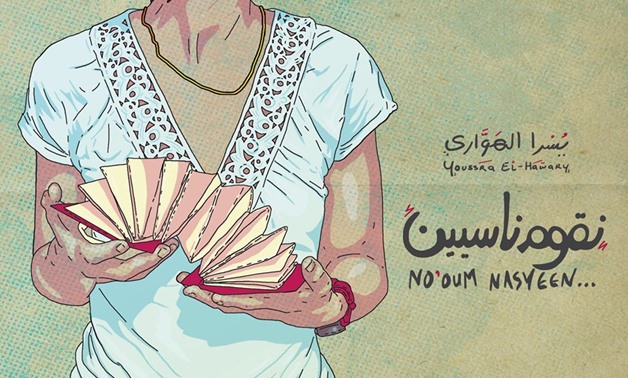
Album cover of “Neo’om Nasyeen” – Photo courtesy of Youssra El Hawary’s official Facebook page
CAIRO – 15 February 2018: Youssra El Hawary recently launched a new album titled “Neo’om Nasyeen” (We Tend to Forget), which delivers a unique, innovative music experience through her new fusions and discrete sounds.
The Egyptian music market usually doesn’t rely on music genre classification as a measurement unit for the level of demand and success of a music album; you can’t name a certain music genre that will always succeed or vice versa, but the potential of success in the Egyptian music market could be measured on how the tunes, compositions, music styles and lyrics can be differentiated.
In that case, there is a huge diversity of music genres, as each can surprise by making it to the pop scene top charts and mass audiences.
Compilation of music genres
Hawary has been working on her music competitive edge since she decided to play music in 2011, as she relied on her light spirit and simple, but effortlessly beautiful, singing. The diatonic accordion highlighting these two factors gives her project a twist not previously witnessed in Egypt.
The story with the album was different, as some events in Hawary's personal life and that of her band as well helped them deliver such music quality and uniqueness. Her accordion, jazz and more music studies in France led to a magical effect on the album, a road from which anyone can tell how different Hawary and her music project are, plus the improvement of quality and the musical personality.
First, Egypt is not a market that believes in music genre classification as a sole means to judge an album or an artist, neither for artists nor audiences, but it can be used through musicians, composers and music producers to put an edge to a certain project that would make it look different among remaining participants.
Hawary's album’s sound is different due to many reasons. The first reason is her Gypsy jazz style, a music genre created in the 1930s by famed French musician Jean "Django" Reinhardt. It is a subgenre from the classic music genre "Bal-musette", which depends on the accordion as a main instrument, along with the banjo.
She added some instruments that were not usually used in that genre, such as drums and bass, giving a groove to the tunes to make people dance. Also, Hawary added mandola to replace banjo, along with the addition of violin, harmonica and oriental percussions, such as the Egyptian tabla and doff, giving the genre a new twist through the mix of instruments.
Gypsy jazz is the main music genre characterizing Hawary, but fusing classical French Bal-Musette, Gypsy jazz and folk music, alongside oriental music, confirms how different and special this project is.
Words with emotional meanings
The lyrics express Hawary's personality and life experiences, but the beauty of the words in this album is apparent with the metaphors used to express them, as much as realism and sarcasm is an element.
The way the lyricists who worked on this album used figure of speech was as special as Hawary's voice when singing them. For example, in the tune dubbed “Kashkouly” (My Notebook), lyricist Salam Yousry compared a woman’s love for her man to a notebook that she lost. She also mentions his advantages and regrets after losing it without hugs or proper goodbyes. That was not the only track that had strong metaphors. “La Tesmaa Kalamy” (Don’t Listen to Me) was a strong figure of speech for treating her heart as a human being to whom she expresses her problems.
The independent young singer also used realism to discuss social issues; for example, “Kollena Hannam Belleil” (We Will All Sleep Tonight) and “Bas Kollo Yehoun” (But Everything Matters) describes the fears and corruption taking place in everyday social life. The songs’ lyrics urged people not to worry much about those problems, since they will sleep and wake up with no burden to carry on their shoulders.
Sarcasm was the primary tone utilized in her lyrics, which got Hawary to the forefront of social media feeds with her hit release of “El Soor” (The Fence), a first for the young artist at the time. In another single, “Jessica,” she describes the complexities of heterosexual romantic relationships, expressing the anger of a jealous lover with the words “God bless Jessica.”
Shining in a developing independent music scene
Hawary’s music debut was a bit different from others. When she started to believe she had something different to propose to the world, she decided to hold a trial concert in order to decide whether or not her project was worth the effort she’s willing to give. The answer became clear: the audience liked it to a level she didn’t expect.
Hawary recorded “El Soor” one month after her debut concert. Her musician friends, who later became her band, suggested it was time to take the big step and record her first track. The track’s impact was great, gaining huge viewership on YouTube. It also won the Fair Play Global Music Video award from Brazil for original songs on the theme of anti-corruption — it was shocking, unexpected and led to beautiful news that pushed Hawary to form her band and invade the Egyptian music scene.

Comments
Leave a Comment